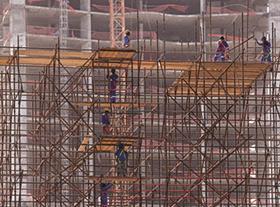Exclusive: Firm says housing will provide ‘dignified’ conditions as scrutiny grows on World Cup labour practices

A Qatari start-up consultant, founded by two British former Davis Langdon partners, is launching a venture to build humane accommodation for 2022 World Cup construction workers, Building can reveal.
Quantex Qatar - founded 18 months ago by former Doha-based Davis Langdon partners Simon Trafford and Neil Hamilton - has teamed up with US-based developer Global Building Solutions (GBS) to launch the initiative.
The venture partners have acquired a number of sites in Qatar suitable to build “workers’ villages” to house the country’s rapidly growing construction workforce.
Quantex Qatar and GBS told Building their proposed workers’ accommodation would “guarantee […] dignified and humane conditions” for workers, including plumbing, electricity and catering, retail, and recreational facilities.
Trafford said: “It is designed with one thing in mind - to improve the lives of the migrant workers who are fundamental to the success of Qatar 2022.”
Quantex Qatar and GBS have secured their first deal to build a three-phased workers’ village providing up to 7,000 beds and are targeting 10% of the marketplace within two years. Construction will begin by the end of the year.
Michael Murphy, GBS chief executive, said: “We will build and operate the facilities at our cost, and will simply rent them out on a contract basis.
“We are also seeking to provide the market with an insurance-backed guarantee that our facilities will meet both Qatar Foundation and international standards - giving clients secure peace of mind.”
Qatar will require an additional 500,000 to 1 million construction labourers - on top of the estimated 600,000 to 800,000 labourers currently in the country - to build the £4bn of World Cup stadiums and £200bn of supporting infrastructure needed by 2022.
Many of these migrant workers are recruited under Qatar’s “kafala” system, whereby migrant workers are subjected to strict controls by their employer, or “sponsor”, leaving some workers unable to leave the country or change jobs without permission - although reports this week suggest the Qatari government is reviewing this.
The conditions labourers face in Qatar - the majority of whom migrate there from south and south-east Asia - have come under intense scrutiny in recent months.
Amnesty International launched a damning report this week, which said Qatar’s construction sector was “rife with abuse”. In the report, based on interviews with workers, employers and government officials, Amnesty documented abuses, including non-payment of wages, harsh and dangerous working conditions and “shocking” standards of accommodation.
Salil Shetty, secretary general of Amnesty International, urged the Qatar government, Fifa, the Qatar 2022 organising committee and domestic and international firms working in Qatar to do more to end the exploitation of the workforce.
He urged companies to “be proactive” and “not just take action when abuses are drawn to their attention”.
UK companies, including Gardiner & Theobald, Arup, Zaha Hadid, and EC Harris are all working on plans for Qatar World Cup 2022 venues and infrastructure. Dozens of other UK firms also operate in the country.
Amnesty did not mention any UK firms in its report.
In September the International Trade Unions Congress estimated up to 4,000 workers could die constructing stadiums and infrastructure for the 2022 World Cup ifconditions were not improved.
Building understands the UK’s ambassador in Qatar is lobbying the World Cup organisers on workers’ rights, while the UK’s Health and Safety Executive (HSE) is also advising Qatari authorities.
The increased focus on workers’ conditions came as Zaha Hadid and Aecom unveiled designs for the first Qatar World Cup stadium to be developed, the 40,000-seater Al Wakrah stadium, in Doha at the weekend.
The head of the Qatar 2022 supreme committee, Hassan Al Thawadi, said at the launch that workers’ rights and conditions on Qatar 2022 construction projects would be protected.
He said the committee launched a workers’ charter in April that would “ensure the health, safety and dignity of workers.” He added: “Any number of deaths over zero is unacceptable.”
The contract to build the Al Wakrah stadium will be the first to incorporate contractual standards to enforce the workers’ charter, the supreme committee said.
UKTI expects further UK firms to be successful on World Cup 2022 stadiums and infrastructure.


























No comments yet